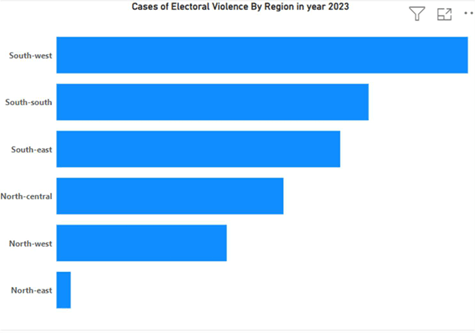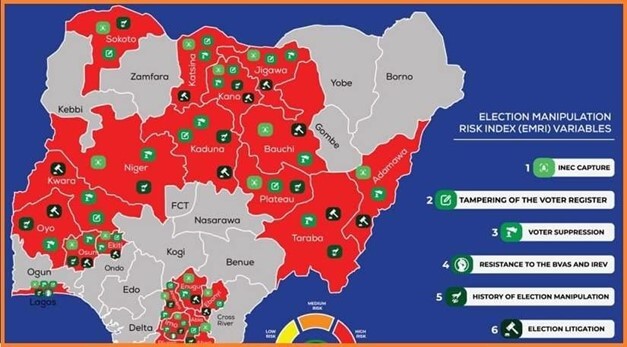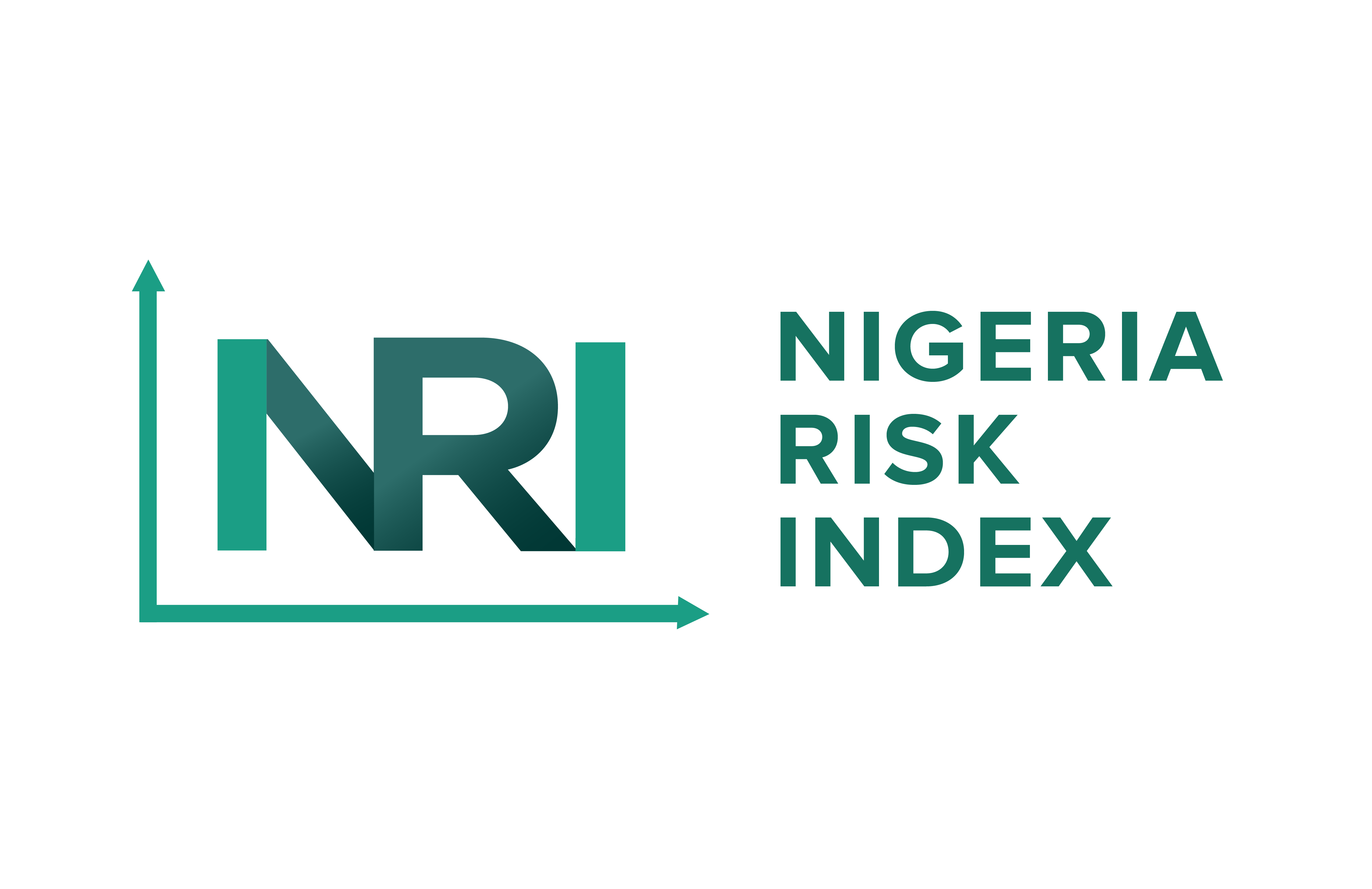Insights
Nigeria's elections are a crucial moment for the nation, with significant risks of political violence that threaten electoral security. Understanding these risks and identifying potential hotspots are essential for ensuring a peaceful and credible election process.
Risks Associated with the Elections
The historical context of Nigeria's elections reveals a pattern of violence, including political assassinations, voter intimidation, and communal unrest. For instance, the 2023 elections witnessed widespread violence, indicating the persistent nature of these threats for future elections. The circulation of illegal small arms exacerbates the situation, with over a million such weapons reportedly in Nigeria. These arms perpetuate violent conflict and create cycles of instability, making the electoral environment even more precarious.
1. Historical Precedents
Nigeria's electoral history is marred by violence, including political assassinations, voter intimidation, and communal unrest. The 2023 elections saw widespread violence, highlighting ongoing risks for future polls (Crisis Group) (United States Institute of Peace). The South West Region recorded the highest number of electoral violence incidents in year 2023.

Source: Nigeria Risk Index
2. Proliferation of Small Arms
The circulation of illegal small arms exacerbates violence. Over a million illegal small arms are estimated to be in Nigeria, fueling electoral violence and creating a cycle of instability (Ideas for Peace).
3. Insecurity and Banditry
States like Zamfara and Kaduna are plagued by bandit gangs and insurgent activities, leading to widespread displacement and insecurity. This environment threatens the safe conduct of elections and the ability of citizens to vote freely (HRW).
4. Sectarian and Ethnic Tensions
Areas such as the southeast, including Imo State, face violence from secessionist groups aiming to disrupt the electoral process. These tensions can lead to significant disruptions and voter intimidation (HRW).
5. Economic Strain and Youth Disillusionment
High unemployment, inflation, and poverty rates contribute to political unrest. Youths, energized by movements like #EndSARS, demand better governance, which can lead to heightened tensions if not addressed (Crisis Group).
Potential Hotspots
Specific regions are identified as potential hotspots for electoral violence. The Boko Haram insurgency continues to destabilize Northeast Nigeria, making it a high-risk area. The Northwest, particularly Zamfara and Kaduna, remains volatile due to banditry and communal conflicts. In the Southeast, Imo and other areas are vulnerable to violence from secessionist groups. The Middle Belt, including states like Plateau and Benue, frequently experiences clashes between ethnic groups and herders, further adding to the risk of electoral violence.
1. Northeast Nigeria: The Boko Haram insurgency continues to destabilize the region, making it a high-risk area for electoral violence.
2. Northwest Nigeria: States like Zamfara and Kaduna are hotspots due to banditry and communal conflicts.
3. Southeast Nigeria: Imo State and other southeastern areas are vulnerable to violence from secessionist groups.
4. Middle Belt: States in the Middle Belt, such as Plateau and Benue, experience frequent clashes between ethnic groups and herders.
 Source: Premium Times
Source: Premium Times
Security Recommendations
To mitigate these risks, several security measures are recommended. Enhanced security deployments in identified hotspots are crucial, ensuring that well-trained and impartial forces protect polling stations and voters.
Implementing comprehensive early warning systems to identify and address potential violence is essential. These systems should gather intelligence on threats and develop contingency plans accordingly.
- Enhanced Security Measures: Deploying adequate security personnel, particularly well-trained and impartial forces, is crucial to protect polling stations and voters. This is important because it helps prevent electoral violence in identified hotspots, ensuring a safe environment for voters to exercise their rights without fear of intimidation or harm. (HRW).
- Early Warning Systems: Implementing comprehensive early warning systems is essential to identify and mitigate potential violence before it escalates. By gathering intelligence on threats and developing contingency plans, authorities can proactively address risks, preventing conflicts from disrupting the electoral process. (HRW).
- Disarmament Programs: Addressing the proliferation of small arms through disarmament, demobilization, and reintegration (DDR) programs is vital to reduce the availability of weapons that fuel electoral violence. This helps to break the cycle of violence and instability, contributing to a safer and more secure election environment. (Ideas for Peace).
- Community Engagement: Fostering dialogue among community leaders, youth groups, and political parties promotes peaceful electoral participation and conflict resolution at the grassroots level. This recommendation is important because it encourages local ownership of the peace process, reducing tensions and fostering a culture of non-violence during elections. (United States Institute of Peace).
- Strengthen Legal Frameworks: Ensuring the prosecution of electoral offenders is critical to deterring future violence. Effective collaboration between the Independent National Electoral Commission (INEC) and security agencies in investigating and prosecuting electoral crimes sends a strong message that violence will not be tolerated, thereby reinforcing the rule of law. (HRW).
- Voter Education: Conducting widespread voter education campaigns is important to inform citizens about their rights and the significance of peaceful participation in the electoral process. Educated voters are more likely to engage constructively in elections, reducing the likelihood of violence and contributing to the credibility and legitimacy of the electoral outcome. (Crisis Group).
Addressing these risks with targeted security measures and community engagement, Nigeria can work towards a more peaceful and secure electoral process. The collaboration of government agencies, civil society, and international partners will be crucial in achieving this goal.

The Risk Control Team
Related Blog Posts
- GENOCIDE OF CHRISTIANS – IS NIGERIA GUILTY AS CHARGED?
- Is Nigeria under President Tinubu’s Administration, Finally Controlling Its Economic Risks?
- Northern Nigeria’s Peace Deals With Bandits: Truce or Time Bomb?
- The Dangote-Transporters Impasse: A Clash of Modernisation and Tradition
- Nigeria’s Mandatory Taxpayer Identification Number (TIN)Policy
